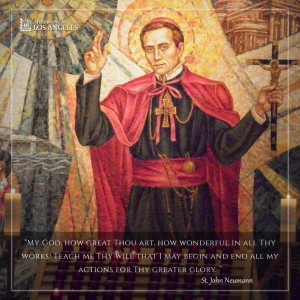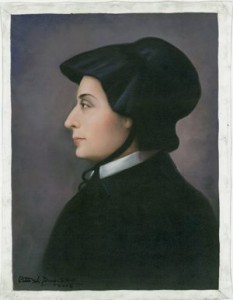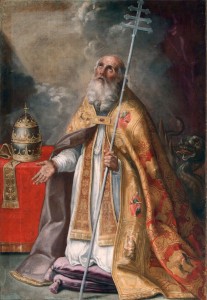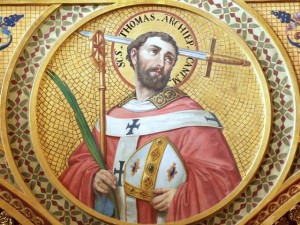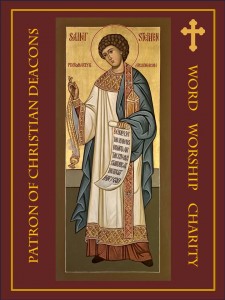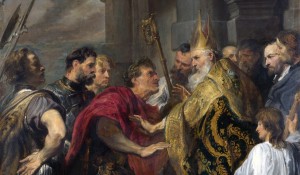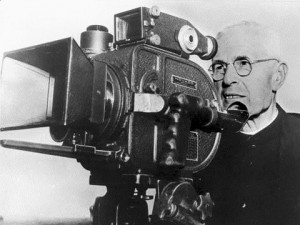 We all know the Daughters of St Paul and appreciate their gift for sharing the Catholic faith through the media, print and electronic. In the US, the Daughters have been well placed to live the new evangelization all because Blessed James Alberione.
We all know the Daughters of St Paul and appreciate their gift for sharing the Catholic faith through the media, print and electronic. In the US, the Daughters have been well placed to live the new evangelization all because Blessed James Alberione.
James Alberione, known with enthusiasm as the Apostle of Communications Media, was a man of great talent and deep friendship. Don Alberione (1884-1971), as the Italians would have called him, was very charismatic person. He served during the Second Vatican Council as a peritus (theological expert), participating in the private sessions during which the decrees of the Council were formed and shaped, for the approval of the Council Fathers in full session. What would he have done today had he lived in slightly different era of the 20th and 21st centuries! Nevertheless, God gave him terrific graces for the proclamation of the Gospel until he died in 1971. He founded 10 religious congregations and lay groups:
After founding the Society of St. Paul, he gathered a group of women in 1915 with Venerable Mother Tecla Merlo, the Daughters of St. Paul.
1918: The Association of Pauline Cooperators1924: The Pious Disciples of the Divine Master (PDDM), with Servant of God Mother Maria Scolastica Rivata, the contemplative members of the Pauline Family whose members would be especially dedicated to Eucharistic Adoration, Liturgical Preparations, and Priestly Services.
1938: The Sisters of Jesus the Good Shepherd (also known as: “Pastorelle”) works in schools and parishes by providing religious instruction
1957: The Sisters of Mary Queen of Apostles works and pray for vocations for the Pauline Family and to the Religious Life
1958: The Institute of St. Gabriel the Archangel (lay consecrated men whose apostolate is also that of the Society of St. Paul)
1958: The Institute of Mary of the Annunciation (lay consecrated women whose apostolate is also that of the Society of St. Paul)
1959: The Institute of Jesus the Priest (for diocesan clergy who would like to adopt the Pauline Spirituality to their ministry),
1960: The Institute of the Holy Family (for married couples) and
At Mass when Pope Saint John Paul II beatified Father James, he delivered this homily:
Fr. James Alberione, Founder of the Pauline Family, was one of the most creative apostles of the 20th century. He was born in San Lorenzo di Fossano (Cuneo), Italy, on 4 April 1884 and baptized the following day. The profoundly Christian and hard-working Alberione family, made up of Michael and Teresa Allocco and their six children, were farmers.
Little James, the fourth child of the family, felt the call of God early in life. When questioned by his first-grade teacher as to what he wanted to be when he grew up, he replied, “I want to be a priest!”. His childhood years were directed to this goal.
When the Alberione family moved to Cherasco, in the Alba diocese, the parish priest of St. Martin’s Church, Fr. Montersino, helped young James to reflect on God’s call and respond to it. At the age of 16, James entered the seminary of Alba and immediately met Canon Francesco Chiesa, who would be his father, guide, friend and advisor over the next 46 years.
At the end of the Holy Year of 1900, James, who had read and reflected deeply on Pope Leo XIII’s encyclical, Tametsi Futura, underwent an experience that would give direction to the rest of his life. On the night of 31 December 1900, the night that divided the 19th and 20th centuries, he prayed for four hours before the Blessed Sacrament and contemplated the future in the light of God. A “particular light” seemed to come from the Host and roused in him a sense of obligation “to do something for the Lord and for the people of the new century”: he felt “obliged to serve the Church” with the new instruments provided by human ingenuity.
James continued his intensive study of philosophy and theology and on 29 June 1907 he was ordained a priest. His time as assistant pastor in Narzole (Cuneo) was brief but decisive from the perspective of pastoral experience. In Narzole he met little Giuseppe Giaccardo, who would be to him as Timothy was to the Apostle Paul. It was also in Narzole that Fr. Alberione came to a clearer understanding of what women could do in the apostolate.
Fr. Alberione served as spiritual director to both the major and minor seminarians in the Seminary of Alba, where he also taught various subjects. He helped out with preaching, catechesis and giving conferences in the various parishes of the diocese. In addition to this, he devoted much time to studying the civil-ecclesial situation and the newly-emerging needs of society.
He came to understand that the Lord was guiding him toward a new mission: to preach the Gospel to all peoples, in the spirit of the Apostle Paul, using the modern instruments of communication. This is confirmed by two books he wrote: Notes on Pastoral Theology (1912) and Woman Associated to Priestly Zeal (1911-1915).
For the sake of charism and continuity, such a mission needed to be carried out by consecrated persons because “the works of God are performed by men and women of God.” Thus, on 20 August 1914, while Pope Pius X lay dying in Rome, Fr. Alberione initiated the Pauline Family in Alba by founding the Pious Society of St. Paul. The Institute was born in utter poverty, according to the divine pedagogy: “always begin from Bethlehem.”
The human family—to which Fr. Alberione turned for inspiration—is made up of brothers and sisters. The first woman to follow Fr. Alberione was 21-year-old Teresa Merlo from Castagnito (Cuneo). With her help, Fr. Alberione began a second Congregation in 1915: the Daughters of St. Paul. Slowly the “Family” grew, both masculine and feminine vocations increased, and the apostolate began to take shape.
In December 1918, his first “daughters” left for Susa, where the work they initiated forms part of the courageous story of faith and enterprise that gave rise to what came to be called the “Pauline” lifestyle. But progress came to an abrupt halt in 1923 when Fr. Alberione fell gravely ill and the doctors despaired of his recovery. However the Founder was able to miraculously resume his journey, later saying, “St. Paul healed me.” During that period, the words Fr. Alberione had received in a dream or revelation from the Divine Master were first inscribed on the walls of the Family’s chapels: “Do not be afraid. I am with you. From here I want to enlighten. Be sorry for sin.”
The following year, a second feminine Congregation came into being: the Pious Disciples of the Divine Master, whose members would carry out the Eucharistic, priestly and liturgical apostolate. To guide this Institute, Fr. Alberione chose the young Sr. M. Scholastica Rivata, who died at the age of 90 in a state of holiness.
On the apostolic level, Fr. Alberione promoted the printing of popular editions of the Bible and used the swiftest instrument of the time—periodicals—to help the message of Christ reach even those furthest away. He had already begun the magazine Vita Pastorale (The Pastoral Life) in 1912 for parish priests. In 1931 he launched Famiglia Cristiana, (Christian Home) a weekly magazine to nourish the Christian life of families. Other periodicals followed: (Madre di Dio) Mother of God (1933), “to reveal the beauty and greatness of Mary to people”; Pastor Bonus (Good Shepherd) (1937), a monthly magazine in Latin; Via, Verità e Vita (Way, Truth, Life) (1952), a monthly dedicated to the teaching of Christian doctrine; (Vita in Cristo nella Chiesa) Life in Christ and in the Church (1952), to help people “get to know the treasures of the Liturgy, disseminate the things that serve it, and live it according to the mind of the Church.” Turning his attention to young people, Fr. Alberione began the weekly children’s magazine, Il Giornalino (The Little Newspaper).
The Founder also built the magnificent Church of St. Paul in Alba, followed by two Churches to the Divine Master (in Alba and Rome) and the Sanctuary of the Queen of Apostles (Rome). Above all, he strove to reach beyond local and national borders. In 1926, he established a branch house in Rome, followed over the years by many foundations in Italy and abroad.
Meanwhile, Fr. Alberione’s spiritual “edifice” was growing. He inculcated in his followers a spirit of dedication by means of deeply apostolic devotions: to Jesus Master and Shepherd “Way, Truth and Life,” to Mary Mother, Teacher and Queen of Apostles, and to St. Paul the Apostle. In fact, it was this reference to the Apostle that gave his new institutes their identity as the “Pauline Family.” The goal that Fr. Alberione wanted his sons and daughters to pursue above all was complete conformation to Christ: to embrace the whole Christ Way, Truth and Life with one’s entire being: mind, will, heart and physical energies. This orientation was codified in his small book, Donec Formetur Christus in Vobis (That Christ Be Formed in You) (1932).
In October 1938, Fr. Alberione founded a third feminine Congregation: the Sisters of Jesus the Good Shepherd or “Pastorelle Sisters,” to assist parish priests in their work.
During the enforced “break” of World War II (1940-1945), Fr. Alberione did not suspend his spiritual itinerary but continued to embrace the light of God more and more, in a climate of adoration and contemplation. Witness to this can be found in the Founder’s spiritual notebooks, in which he jotted down his inspirations and the means he adopted to correspond to the plan of God. This spiritual milieu nurtured the meditations he guided every morning for his sons and daughters, as well as his directives for the apostolate and the numerous retreats and courses of spiritual exercises he preached (the conferences of which were collected together into various volumes). Fr. Alberione’s primary focus remained unswerving: to help everyone understand that “the first concern of the Pauline Family should be holiness of life; the second, holiness of doctrine.” It is in this light that he forged ahead with his Project for an Encyclopedia on Jesus Master (1959).
In 1954, to celebrate the 40 anniversary of foundation of the Pauline Family, Fr. Alberione for the first time allowed something about himself to be written down (the material appears in the book Mi protendo in avanti – “I Strain Ahead”), and he also complied with the request to jot down some thoughts concerning the beginnings of his foundations. Thus came into being the small book, Abundantes divitiae gratiae suae, “a charismatic history of the Pauline Family.” This Family was completed between 1957-1960 with the foundation of a fourth feminine Congregation, the Queen of Apostles Institute for vocations (Apostoline Sisters), and several secular institutes for the consecrated life: St. Gabriel the Archangel, Our Lady of the Annunciation, Jesus Priest, and the Holy Family. Ten institutes (including the Pauline Cooperators), united by the same ideal of holiness and apostolate: to bring Jesus Christ Way, Truth and Life to the world through the instruments of social communication.
From 1962-1965, Fr. Alberione was a silent but attentive protagonist in Vatican Council II, attending its sessions daily. But at the same time troubles and sufferings were not lacking: the premature deaths of his first collaborators, Timothy Giaccardo and Thecla Merlo; worry for the Pauline communities abroad that were going through difficulties and, on the personal level, an excruciatingly painful condition of scoliosis that tormented him day and night.
Fr. Alberione lived to the age of 87. Having completed the work God had entrusted to him, he left this earth on 26 November 1971 to take his place in the house of the Father. In his last hours, he was comforted by the visit and blessing of Pope Paul VI, who had never hidden his admiration and veneration for the Founder. In fact, in an audience with the Pauline Family on 28 June 1969, the Pope spoke these moving words about Fr. Alberione, who was then 85 years old:
“There he is: humble, silent, tireless, always vigilant, recollected in his thoughts, which run from prayer to action; always intent on scrutinizing the ‘signs of the times,’ that is, the most creative ways to reach souls. Our Fr. Alberione has given the Church new instruments with which to express herself, new means to give vigor and breadth to her apostolate, new capacities and a new awareness of the validity and possibilities of his mission in the modern world with modern means. Dear Fr. Alberione, allow the Pope to rejoice in your long, faithful and tireless work and in the fruits it has produced for the glory of God and the good of the Church.”
On 25 June 1996, Pope John Paul II signed the decree recognizing the heroic virtues of the future Blessed.
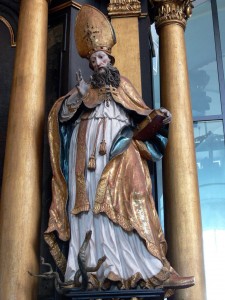 I think Hilary is a most fascinating saint given his humanity, the vigor of his intellect and the beauty of his lived faith. He is a convert at the age of 35. His first premise is the love of God and our response to the love. The incarnation of the Eternal Word of God, Jesus –love: God stooped down to us so that can reach up to touch Him.
I think Hilary is a most fascinating saint given his humanity, the vigor of his intellect and the beauty of his lived faith. He is a convert at the age of 35. His first premise is the love of God and our response to the love. The incarnation of the Eternal Word of God, Jesus –love: God stooped down to us so that can reach up to touch Him.